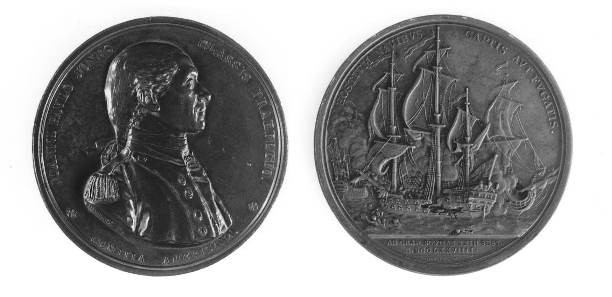By Amanda M. Norton, Adams Papers
On July 6, 1747, John Paul Jones was born in Scotland. He is widely credited as the father of the American Navy for his successful campaigns as a captain during Revolutionary War. It would be fair, however, to say that John Adams might deserve a share in that title as well. From his role in drafting the original rules for the Continental Navy in 1775 to his organization of the newly created Department of the Navy as president in 1798, Adams had been a strong advocate of “Floating Batteries and Wooden Walls” as the primary system of war and defense for the young nation.
Jones and Adams got to know each other in the late 1770s while Adams was in Europe, and no one who is familiar with the Adamses will be surprised to learn that both John, and later Abigail, formed strong opinions about Jones.
John Adams noted his impression in his diary entry for May, 13 1779: “This is the most ambitious and intriguing Officer in the American Navy. Jones has Art, and Secrecy, and aspires very high. . . . Excentricities, and Irregularities are to be expected from him— they are in his Character, they are visible in his Eyes. His Voice is soft and still and small, his Eye has keenness, and Wildness and Softness in it.”
Abigail met Jones when she joined John in Europe after the war had ended, but he was nothing like she had imagined the naval hero to be: “Chevalier Jones you have heard much of. He is a most uncommon Character. I dare Say you would be as much dissapointed in him as I was. From the intrepid Character he justly Supported in the American Navy, I expected to have seen a Rough Stout warlike Roman. Instead of that, I should sooner think of wraping him up in cotton wool and putting him into my pocket, than sending him to contend with Cannon Ball,” she wrote. “He is small of stature, well proportioned, soft in his Speach easy in his address polite in his manners, vastly civil, understands all the Etiquette of a Ladys Toilite as perfectly as he does the Masts Sails and rigging of a Ship. Under all this appearence of softness he is Bold enterprizing ambitious and active.”

While they did not become close friends, John Paul Jones did offer JA his bust, and to the end of his life, JA remembered Jones as intelligent, a good letter writer, and “gentlemanly in his dress & manner.” As both men regarded the American Navy as central to the success of the nation, Adams never failed to respect Jones’ naval ability or the “glorious success” of Jones’ famous capture of the British frigate Serapis, for which the Continental Congress awarded Jones a medal, the first to commemorate a naval victory. A restrike of that medal is housed within the collections of the Massachusetts Historical Society.

